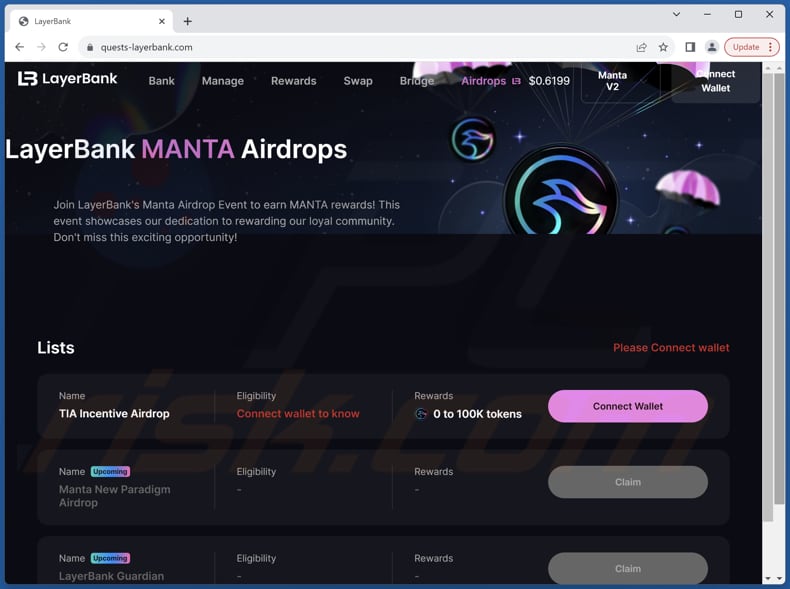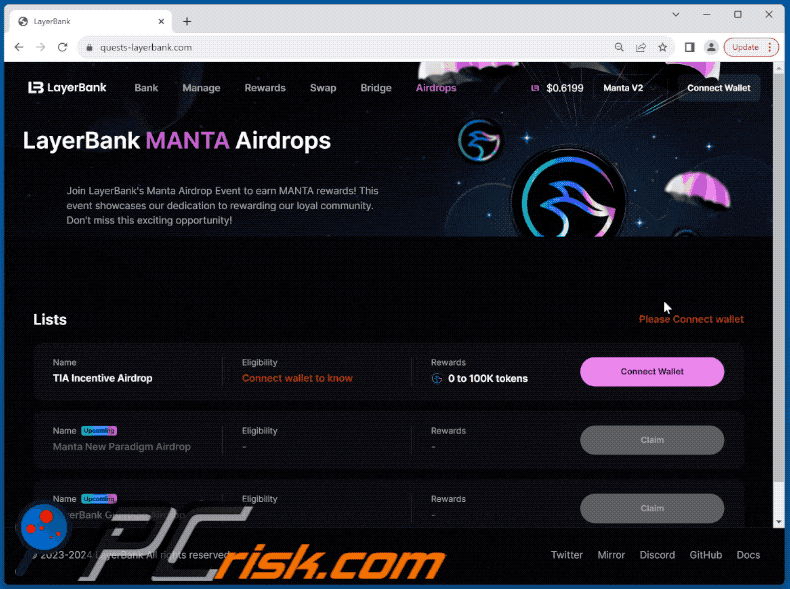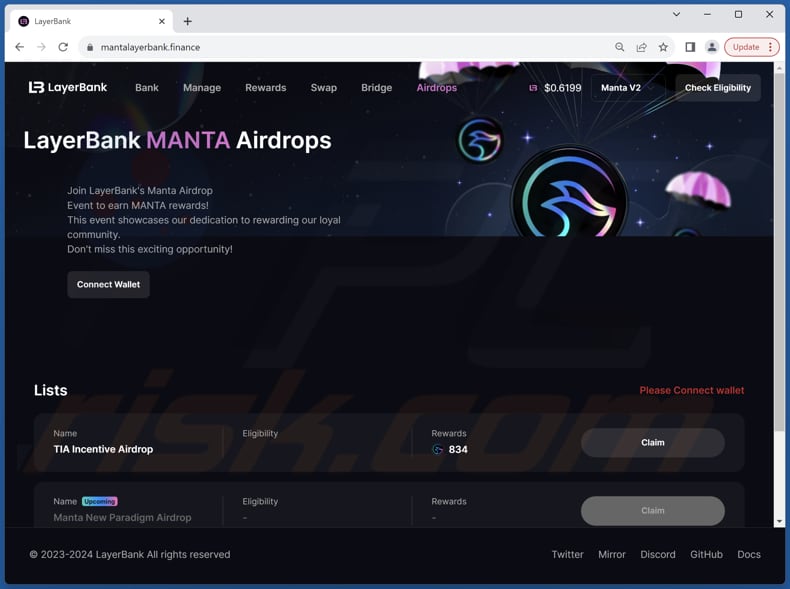How to identify deceptive schemes like "Layer Bank MANTA" airdrop
Phishing/ScamAlso Known As: Layer Bank MANTA fake giveaway
Get free scan and check if your device is infected.
Remove it nowTo use full-featured product, you have to purchase a license for Combo Cleaner. Seven days free trial available. Combo Cleaner is owned and operated by RCS LT, the parent company of PCRisk.com.
What is "Layer Bank MANTA Airdrop"?
During our investigation of the Layer Bank MANTA airdrop, we discovered that it masquerades as a legitimate giveaway but is, in fact, a scam designed to exploit unsuspecting individuals. This malicious scheme not only poses a risk to users' crypto assets but also undermines trust in legitimate airdrop initiatives within the cryptocurrency community.

"Layer Bank MANTA Airdrop" in detail
Numerous counterfeit websites are propagating this scam, all exhibiting strikingly similar appearances. Within these sites, LayerBank's Manta Airdrop Event falsely pledges MANTA rewards, purportedly, as a token of gratitude for its devoted community. These platforms lure potential victims with fabricated lists of airdrops and associated rewards.
The primary aim of this fraudulent scheme is to deceive recipients into clicking the "Connect Wallet" button and adhering to the provided instructions, which ultimately entails signing a malicious contract. Upon completing this deceptive process, the victim unwittingly activates a crypto drainer, which transfers their crypto funds to the scammer's wallet, resulting in financial loss.
One crucial aspect of crypto transactions is their irreversibility, or near irreversibility, which poses significant risks to victims of scams. Once a malicious contract is signed or funds are transferred to a scammer's wallet, it is extremely challenging, if not impossible, to recover the lost funds.
Victims who fall for scams like LayerBank's Manta Airdrop Event risk losing their money permanently, as there is often no recourse or central authority to appeal to for assistance. This inherent characteristic of crypto transactions underscores the importance of vigilance and caution when participating in crypto-related activities to avoid falling victim to scams and financial losses.
| Name | Layer Bank MANTA fake giveaway |
| Threat Type | Phishing, Scam, Social Engineering, Fraud |
| Fake Claim | Participants can receive free cryptocurrency |
| Disguise | Legitimate giveaways (airdrops) |
| Related Domains | quests-layerbank[.]com, manta-layerbank[.]com, quest-layerbank[.]com, layerbank[.]trade, bonus-layerbank[.]com, layerbank[.]claims, layerbank[.]trading, layerbank[.]events, join-layerbank[.]com, bonuses-layerbank[.]com, mantalayerbank[.]finance. |
| Symptoms | Lack of official verification, unrealistic claims, too good-to-be-true promises. |
| Distribution methods | Stolen or compromised X (Twitter) accounts, deceptive websites, rogue online pop-up ads, potentially unwanted applications. |
| Damage | Loss of sensitive private information, monetary loss, identity theft, possible malware infections. |
| Malware Removal (Windows) |
To eliminate possible malware infections, scan your computer with legitimate antivirus software. Our security researchers recommend using Combo Cleaner. Download Combo CleanerTo use full-featured product, you have to purchase a license for Combo Cleaner. 7 days free trial available. Combo Cleaner is owned and operated by RCS LT, the parent company of PCRisk.com. |
Conclusion
In conclusion, scams like LayerBank's Manta Airdrop Event underscore the need for heightened awareness and caution within the crypto community. These deceptive schemes exploit the trust and enthusiasm of users, promising rewards while ultimately leading to financial losses.
As crypto transactions are irreversible, victims often have little recourse to recover their funds once they have fallen prey to such scams. It is imperative for individuals to exercise diligence, thoroughly research any offers or promotions, and verify the authenticity of websites and platforms before engaging in crypto-related activities.
Examples of similar scams are "Seiyans Mint", "Blast Airdrop", and "BitDogs Mint Free".
How these scams are promoted?
Malicious actors employ various tactics to lure victims to fake websites posing as cryptocurrency projects. One common approach involves registering lookalike domain names and capitalizing on popular domain extensions used by legitimate projects. These fake sites often offer enticing pretexts such as airdrops or NFT minting, exploiting the popularity of these activities in the crypto community.
Additionally, scammers may resort to unconventional methods like hacking legitimate X (Twitter) accounts, including those of blockchain security companies, to draw users to their deceptive sites. Furthermore, scammers utilize ads on social media and search engines, strategically placing sponsored links above organic search results to intercept users seeking legitimate crypto project websites.
How to avoid visiting scam pages?
Exercise caution when encountering unsolicited emails, messages, or social media posts advertising offers that seem too good to be true. Verify the legitimacy of websites by thoroughly inspecting the URL and seeking feedback from other users. Avoid clicking on dubious links or ads, particularly those promising unrealistic rewards.
Additionally, avoid agreeing to receive notifications from untrustworthy websites and refrain from downloading apps from questionable sources such as unofficial pages or third-party app stores. If your computer is already infected with unwanted apps, we recommend running a scan with Combo Cleaner Antivirus for Windows to automatically eliminate them.
The appearance of "Layer Bank MANTA Airdrop" pop-up scam (GIF):

Another variant of the Layer Bank MANTA Airdrop scam page:

Instant automatic malware removal:
Manual threat removal might be a lengthy and complicated process that requires advanced IT skills. Combo Cleaner is a professional automatic malware removal tool that is recommended to get rid of malware. Download it by clicking the button below:
DOWNLOAD Combo CleanerBy downloading any software listed on this website you agree to our Privacy Policy and Terms of Use. To use full-featured product, you have to purchase a license for Combo Cleaner. 7 days free trial available. Combo Cleaner is owned and operated by RCS LT, the parent company of PCRisk.com.
Quick menu:
- What is Layer Bank MANTA fake giveaway?
- How to identify a pop-up scam?
- How do pop-up scams work?
- How to remove fake pop-ups?
- How to prevent fake pop-ups?
- What to do if you fell for a pop-up scam?
How to identify a pop-up scam?
Pop-up windows with various fake messages are a common type of lures cybercriminals use. They collect sensitive personal data, trick Internet users into calling fake tech support numbers, subscribe to useless online services, invest in shady cryptocurrency schemes, etc.
While in the majority of cases these pop-ups don't infect users' devices with malware, they can cause direct monetary loss or could result in identity theft.
Cybercriminals strive to create their rogue pop-up windows to look trustworthy, however, scams typically have the following characteristics:
- Spelling mistakes and non-professional images - Closely inspect the information displayed in a pop-up. Spelling mistakes and unprofessional images could be a sign of a scam.
- Sense of urgency - Countdown timer with a couple of minutes on it, asking you to enter your personal information or subscribe to some online service.
- Statements that you won something - If you haven't participated in a lottery, online competition, etc., and you see a pop-up window stating that you won.
- Computer or mobile device scan - A pop-up window that scans your device and informs of detected issues - is undoubtedly a scam; webpages cannot perform such actions.
- Exclusivity - Pop-up windows stating that only you are given secret access to a financial scheme that can quickly make you rich.
Example of a pop-up scam:

How do pop-up scams work?
Cybercriminals and deceptive marketers usually use various advertising networks, search engine poisoning techniques, and shady websites to generate traffic to their pop-ups. Users land on their online lures after clicking on fake download buttons, using a torrent website, or simply clicking on an Internet search engine result.
Based on users' location and device information, they are presented with a scam pop-up. Lures presented in such pop-ups range from get-rich-quick schemes to fake virus scans.
How to remove fake pop-ups?
In most cases, pop-up scams do not infect users' devices with malware. If you encountered a scam pop-up, simply closing it should be enough. In some cases scam, pop-ups may be hard to close; in such cases - close your Internet browser and restart it.
In extremely rare cases, you might need to reset your Internet browser. For this, use our instructions explaining how to reset Internet browser settings.
How to prevent fake pop-ups?
To prevent seeing pop-up scams, you should visit only reputable websites. Torrent, Crack, free online movie streaming, YouTube video download, and other websites of similar reputation commonly redirect Internet users to pop-up scams.
To minimize the risk of encountering pop-up scams, you should keep your Internet browsers up-to-date and use reputable anti-malware application. For this purpose, we recommend Combo Cleaner Antivirus for Windows.
What to do if you fell for a pop-up scam?
This depends on the type of scam that you fell for. Most commonly, pop-up scams try to trick users into sending money, giving away personal information, or giving access to one's device.
- If you sent money to scammers: You should contact your financial institution and explain that you were scammed. If informed promptly, there's a chance to get your money back.
- If you gave away your personal information: You should change your passwords and enable two-factor authentication in all online services that you use. Visit Federal Trade Commission to report identity theft and get personalized recovery steps.
- If you let scammers connect to your device: You should scan your computer with reputable anti-malware (we recommend Combo Cleaner Antivirus for Windows) - cyber criminals could have planted trojans, keyloggers, and other malware, don't use your computer until removing possible threats.
- Help other Internet users: report Internet scams to Federal Trade Commission.
Frequently Asked Questions (FAQ)
What is a fake crypto giveaway?
A fake crypto giveaway is a scam in which scammers impersonate legitimate cryptocurrency projects or influencers and promise generous rewards or prizes in exchange for participation in fake airdrops, giveaways, or promotional events.
What is the purpose of a fake crypto giveaway (airdrop)?
The purpose of a fake crypto giveaway is to deceive individuals into sending cryptocurrency or providing sensitive information to scammers.
Why do I encounter fake giveaways?
Scammers utilize a range of methods, such as phishing emails, social media platforms, fake websites, unreliable notifications, deceptive ads, and more, to promote their fraudulent schemes. Users frequently encounter these deceitful websites unknowingly while browsing online.
Will Combo Cleaner protect me from pop-up scams?
Combo Cleaner can thoroughly scan every website you visit, efficiently identifying malicious sites, including scams. With this capability, the application alerts users and restricts access to suspicious pages, providing added security against potential threats.
Share:

Tomas Meskauskas
Expert security researcher, professional malware analyst
I am passionate about computer security and technology. I have an experience of over 10 years working in various companies related to computer technical issue solving and Internet security. I have been working as an author and editor for pcrisk.com since 2010. Follow me on Twitter and LinkedIn to stay informed about the latest online security threats.
PCrisk security portal is brought by a company RCS LT.
Joined forces of security researchers help educate computer users about the latest online security threats. More information about the company RCS LT.
Our malware removal guides are free. However, if you want to support us you can send us a donation.
DonatePCrisk security portal is brought by a company RCS LT.
Joined forces of security researchers help educate computer users about the latest online security threats. More information about the company RCS LT.
Our malware removal guides are free. However, if you want to support us you can send us a donation.
Donate
▼ Show Discussion